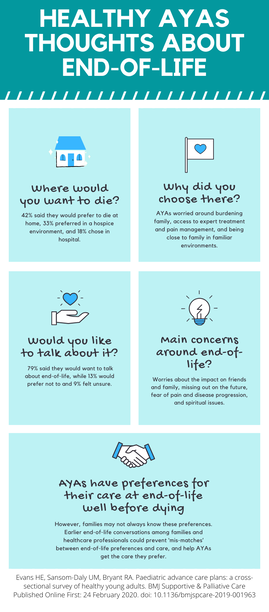
We thought this paper was a really interesting addition to the field, so we wrote a letter in response to Lyon and colleagues’ study, comparing their results to our recent survey exploring the end-of-life communication and care preferences of healthy AYAs. Take a look at the infographic to see what we found.
Looking at Lyon and colleagues’ and our research together highlights that AYAs have preferences for their care at end-of-life well before dying, but that families may not always know these preferences. Our survey also suggests that healthy AYAs even have similar preferences to AYAs with diseases like HIV/AIDS and cancer.
Earlier end-of-life conversations among families and healthcare professionals could prevent ‘mis-matches’ in end-of-life preferences and the care they get, and improve the likelihood of AYAs receiving care according to their wishes. However, work is still needed to understand the barriers to these important conversations, particularly what might be happening psychologically, “behind the scenes”. My PhD work looks at how attachment (or, in other words, whether and how people feel secure and safe in their closest loving relationships) might influence the way that AYAs talk about death, using healthy AYAs to start exploring these new ideas. We will be publishing some of this work very soon and I look forward to talking about it more on our blog!
This paper was led by Holly Evans, the full text can be found here: http://spcare.bmj.com/cgi/content/full/bmjspcare-2019-001963
The paper referenced by Lyon and colleagues can be found here: https://spcare.bmj.com/content/9/1/e22
 RSS Feed
RSS Feed